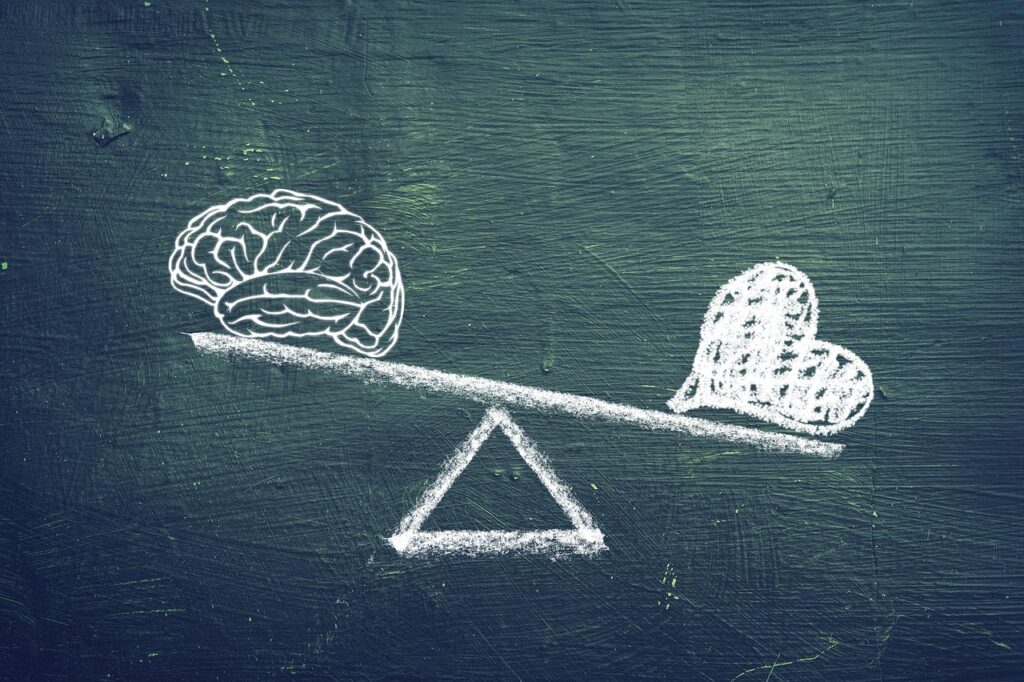Curiosity has led me to begin researching how EQ and IQ work together in our human existence. Emotional Intelligence and Intellectual Quotient measure our emotions and intellectual capabilities.
In our day to day lives, we face situations that challenge us. Contingency planning asks you to consider a time when things aren’t running smoothly. Here are ways EQ and IQ work together:
- Conflict resolution: EQ helps understand the other person’s perspective, while IQ helps solve the issue logically
- Growth: EQ can improve with experience, and IQ is also correlated to genetics and childhood development
- Relationships: EQ is important for building and maintaining relationships, and may be more important than IQ for maintaining positive relationships
- Stress management: EQ is important for managing stress
- Decision making: EQ is important for making informed decisions

Differences Between EQ and IQ
A professional development site Betterup.com provides six differences between EQ and IQ in the workplace. In reading this list, correlations for our lives in general seem to apply!
- Type of ability: Your EQ refers to your emotional abilities and social skills, including cognitive empathy, emotional regulation, and motivation. Conversely, IQ measures your cognitive and intellectual skills, like working memory, analytical thinking, and knowledge retention.
- Information processing: Your EQ is your ability to perceive and understand your and others’ emotions based on information like verbal and nonverbal cues. And your IQ is your ability to learn, interpret, and process information to develop hard and soft skills.
- Interpersonal skills versus job performance: A good EQ means you can empathize with others and control your reactions, significantly influencing your ability to create rewarding relationships. And a good IQ makes you a competent and efficient worker with a robust skill set.
- Internal versus external knowledge: Increasing your EQ involves immense self-awareness to identify your emotions and their subsequent behaviors. But increasing your IQ means acquiring tangible knowledge and practicing concrete skills like solving logic puzzles and performing well on verbal exams.
- Conflict resolution: Your emotional and intellectual intelligence work together to resolve conflicts. The former helps you understand the other person’s perspective and control emotional responses, and the latter determines how logically and efficiently you can solve the issue at hand.
- Growth: You improve your emotional competency with reflection and experience. In some sense, the same is true of your IQ, but human intelligence is also heavily correlated to a complex mixture of genetics and childhood development.
Role Stress Plays
Stress is associated with emotional intelligence (EI), which is related to intelligence quotient (IQ). A study also found negative correlations between stress and emotional awareness and expression, emotional thinking, and emotional regulation.
A 2023 study found that people with elevated stress levels are more likely to experience a decline in cognitive function, affecting their capacity to remember, concentrate, and learn new things.
Emotional intelligence is better suited to handle day to day acute stress and perceived stress. High levels of salivary cortisol, a biochemical marker of stress, improve the coping strategies of subjects with high EI.
Higher emotional intelligence has been found to be correlated to lower psychological distress, moderately related to lower depression, and strongly to lower anxiety.

Photo by Pixabay: https://www.pexels.com/photo/red-and-white-tik-tak-toe-game-illustration-220051/
Be in the Know
You may wonder what this all means for you. EQ and IQ play a role in how you respond to various situations.
During stressful times, it’s not easy to function as you would in non-stressful times. This is why I advocate for planning before you “need” to.
Making time when times are calm to talk about a variety of scenarios allows you to process information and consider your choices more clearly. This is true for all phases and stages of life from young adulthood through post-retirement!
Your wellbeing and overall satisfaction in life is important to me. It is possible to live life fully and plan ahead! Get on my calendar for a complimentary Discovery Call, to discuss how to get started.
To help you plan for your day-to-day life earlier vs. later, my book The Living Planner (What to Prepare Now While You Are Living) is a resource for you. Here is a direct link to my shopping cart. Check it out HERE .
For those who prefer to access information via an online portal, I’ve created a step-by-step 12-Module DIY method: Check it out HERE. Send me an Email or Message me if you have any questions. For additional information about my work check out @ The Living Planner or @ The Living Planner.
“Where flowers bloom so does hope.” —Lady Bird Johnson ❣️ Lynn
#Can’tPredictCanPrepare #PlanfortheUnplanned

